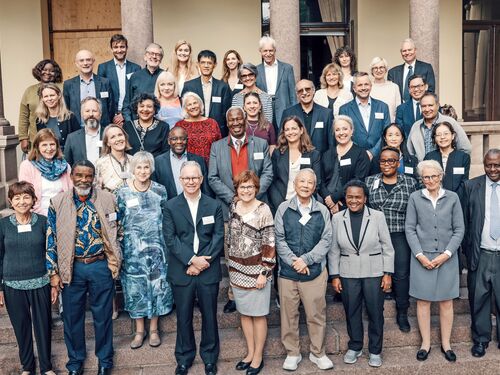Committee on Human Rights
The Committee on Human Rights (CHR) is a standing membership committee of the U.S. National Academy of Sciences, National Academy of Engineering, and National Academy of Medicine. It serves as a bridge between the human rights and scientific communities, in recognition of the importance of rights protection for scientific inquiry and the realization of human dignity worldwide.
Subscribe to CHR's Newsletter | Make a Contribution | Explore New CHR 50th Anniversary Site
In progress
News and Updates
International Meeting on Academic Freedom and Human Rights
Update
The CHR serves as the secretariat to the International Human Rights Network of Academies and Scholarly Societies (IHRN), which recently held its 15th biennial meeting in Oslo, Norway. The meeting, hosted by the Norwegian Academy of Science and Letters, focused on growing challenges to academic freedom worldwide.

Issues at the Intersection of Engineering and Human Rights
Update
Read a newly released proceedings of a symposium that examined how engineering decisions intersect with human rights, social justice, ethics, equity, and global responsibility.

The CHR advocates in support of colleagues subjected to serious human rights abuses worldwide, with a focus on individuals targeted for their professional activities or the exercise of other internationally protected rights.

The CHR works to raise awareness of pressing global challenges at the intersection of science, technology, health, and human rights by hosting/participating in an array of events and developing online resource collections and other initiatives that examine these challenges. The CHR also helps build communities of scientists, engineers, and health professionals that integrate human rights into their work and take action against rights abuses.

Providing assistance to colleagues suffering human rights abuse is a key part of the Committee’s mandate. Alongside its advocacy, the CHR connects colleagues under threat, and their families, to:
• Organizations that assist with academic placements and fellowships
• Pro bono legal providers
• Professional colleagues, for the purpose of developing and maintaining links to the international scientific community
• Other support providers
Colleagues seeking assistance may submit a request to the CHR.

Description
The Committee on Human Rights (CHR), created in 1976, is a standing membership committee of the U.S. National Academy of Sciences (NAS), National Academy of Engineering (NAE), and National Academy of Medicine (NAM). Through advocacy, awareness raising, and assistance, the CHR serves as a bridge between the human rights and scientific communities, in recognition of the importance of rights protection for scientific inquiry and the realization of human dignity worldwide.
Supported by a staff of human rights professionals, the CHR is composed of 13 members drawn from the membership of the three Academies. Roughly 1500 members of the National Academies are “CHR Correspondents” who frequently make appeals in human rights cases identified by the CHR and engage in CHR awareness raising initiatives.

*This activity is not conducted by the National Academies of Sciences, Engineering, and Medicine and may not represent the views of the institution.
Elected members of the National Academies will be added to a private list that additionally receives information on how they can take action in support of professional colleagues under threat worldwide.

Frequently Asked Questions
Frequently Asked Questions
Contributors
Committee
Chair
Vice Chair
Member
Member
Member
Member
Member
Member
Member
Member
Member
Ex Officio Member
Ex Officio Member
Staff Officer
Membership Committee of
Staff
Tracy Sahay
Lead
Patty Evers
Lead
Rebecca Everly
Lead
Ana Deros
Lead

